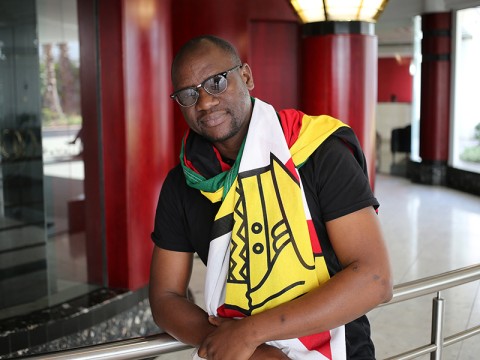Evan Mawarire leads national "stay-away" in Zimbabwe
Also protesting President Robert Mugabe, Archbishop of York John Sentamu hasn't worn a clerical collar in nine years.

Leaning over his desk in Harare, the Zimbabwe flag’s green, red, yellow, and black stripes draped around his neck, Evan Mawarire looked into the camera and launched an uprising.
“This flag, every day that it flies, is begging for you to get involved, is begging for you to say something, is begging for you to cry out,” the Pentecostal pastor told fellow Zimbabweans in the April 20 video.
What started that day as a social media campaign of flag selfies and hashtags developed into a full-fledged movement with Mawarire as its charismatic leader.
On July 6, #ThisFlag organized a nationwide “stay-away,” a shutdown of schools and businesses, to protest endemic corruption, injustice, and poverty. Cities across Zimbabwe, including the bustling capital of Harare where Mawarire leads the His Generation Church, ground to a halt.
Mawarire was summoned for police questioning the following week and charged with inciting public violence, disturbing the peace, and treason. Thousands of supporters went to the magistrate’s court, and nearly 200 lawyers volunteered to represent the pastor. After one night in custody, Mawarire was freed and charges were dropped.
Read our latest issue or browse back issues.
“Zimbabweans are peaceful people, and we can do this very well with peace,” he said in a July 13 video after his release from custody. “Continue to pray for Zimbabwe. God is doing something special and amazing.”
In his dozens of videos, most around three minutes long with upward of 100,000 views, Mawarire often cites the Bible to encourage nonviolent resistance.
Once considered Africa’s breadbasket, Zimbabwe’s economy is now on death’s door after the 36-year rule of President Robert Mugabe. Minister of finance Patrick Chinamasa told French creditors last month, “We literally have nothing.”
The government’s lack of liquidity has meant late paychecks for teachers, doctors, nurses, soldiers, and police. Many officers have taken matters into their own hands, setting up roadblocks to flag minor driving infractions, which disappear with a bribe of $10 or $20. The annual inflation rate exceeded 89 sextillion percent in 2008—rendering the Zimbabwe dollar and its 100-trillion-dollar notes worthless.
Mawarire cites these and other economic factors in his demands to the government. He also calls for corrupt ministers to be fired and charged and for police beatings and abductions to stop.
Mawarire traveled to South Africa immediately after his release from police custody but promised he would return soon. A second, two-day national shutdown was largely ignored, meaning Mawarire may have to change tactics.
The Mugabe regime and its supporters have a long and bloody history of suppressing opposition and dissent. Yet #ThisFlag has emboldened citizens to adopt the spirit of “hatichada, hatichatya,” a Shona rallying call that means “we’ve had enough, we are not afraid.”
“It’s really given a lot of Zimbabweans hope,” Doug Coltart, a Zimbabwean human rights lawyer based in Washington, D.C., told Voice of America on July 5. “It’s really given Zimbabweans a voice, and somehow it has been able to break the fear, I think, that has held Zimbabweans captive for such a long time.”
Faced with death threats and a reported abduction attempt, #ThisFlag’s leader takes strength in his faith and his determination to build a better Zimbabwe.
“My security is God,” Mawarire told the Zimbabwe Independent.
Rather than organizing a massive rally in Harare, which the government likely would have suppressed with force, #ThisFlag shut the country down, sheltering angry civil rights activists in the relative safety of their own homes.
The pastor, who now wears the flag wherever he goes, has the support of fellow faith leaders in predominantly Christian Zimbabwe and beyond. When Mawarire was in custody, the 4.5-million-member Evangelical Fellowship of Zimbabwe issued a statement condemning government failures and the regime’s intimidation of religious leaders.
“These grievances must be viewed as the early warning signs which indicate underlying and simmering tensions that will soon explode into civil unrest if not addressed,” the statement read. “The government should . . . urgently act and address these genuine concerns of the citizens to avoid total collapse of the state.”
Zimbabwe church leaders are not alone in speaking against the Mugabe regime. In 2007, John Sentamu, the Anglican archbishop of York, who is originally from Uganda, took a pair of scissors and cut his clerical collar on live television, saying that Mugabe had “taken people’s identity” and “cut it to pieces.” He vowed not to replace it until Mugabe is out of office, a promise he has now kept for nine years. —Religion News Service





